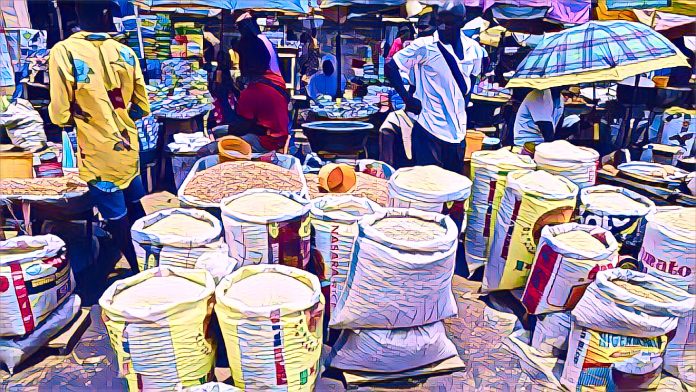Nigeria’s inflation rate surged to 34.19% in June, a significant increase driven primarily by rising food prices. This marks the highest inflation rate the country has seen in recent years, posing serious concerns for both policymakers and citizens.
The National Bureau of Statistics (NBS) reported the jump from 33.7% in May, indicating persistent inflationary pressures. The sharp rise in food prices, particularly staples like rice, bread, and vegetables, has been the primary driver of this inflationary trend. “Food inflation remains the dominant contributor to the overall inflation rate, exacerbated by supply chain disruptions and increased production costs,” the NBS statement noted.
Consumers across Nigeria are feeling the pinch as the cost of living continues to rise. In urban areas like Lagos and Abuja, families are finding it increasingly difficult to afford basic necessities. “Every week, prices go up. It’s becoming harder to manage household expenses,” said Aminu Usman, a resident of Lagos.
The agricultural sector, which is crucial for food production in Nigeria, faces multiple challenges, including insecurity, flooding, and inadequate infrastructure. These factors have disrupted food supply chains, leading to higher prices. “Farmers are struggling with numerous obstacles that hinder food production and distribution. This directly impacts food availability and prices,” said Dr. Tunde Ajayi, an agricultural economist.
In response to the escalating inflation, the Central Bank of Nigeria (CBN) has implemented monetary tightening measures aimed at stabilizing the economy. The CBN recently raised the benchmark interest rate to 14%, hoping to curb inflationary pressures. “We are committed to using all available tools to address inflation and stabilize the economy,” stated Godwin Emefiele, Governor of the CBN.
However, experts argue that monetary policy alone may not be sufficient to tackle the underlying issues driving inflation. Structural reforms are needed to address supply chain inefficiencies and enhance food production. “Inflation in Nigeria is not just a monetary phenomenon; it’s deeply rooted in structural challenges. Comprehensive policy measures are required to achieve lasting stability,” emphasized Ngozi Okonjo-Iweala, an economist and former Finance Minister.
The government has also been urged to take immediate action to support the agricultural sector and ensure food security. Initiatives such as improving rural infrastructure, providing financial support to farmers, and enhancing security in farming regions are critical. “Addressing the root causes of food inflation requires a multi-faceted approach that includes both short-term relief and long-term strategies,” said Akinwumi Adesina, President of the African Development Bank.
As inflation continues to rise, there are concerns about its impact on poverty and social stability. Higher food prices disproportionately affect low-income households, leading to increased hardship and potentially sparking social unrest. “The government must act swiftly to mitigate the adverse effects of inflation on the most vulnerable populations,” warned Dr. Sarah Alade, an economic policy analyst.
Despite the challenges, there is hope that coordinated efforts between the government, private sector, and international partners can help stabilize the economy. By addressing both immediate and structural issues, Nigeria can work towards achieving sustainable economic growth and reducing inflation.
Source: businessday.ng



